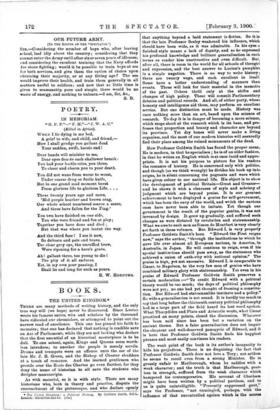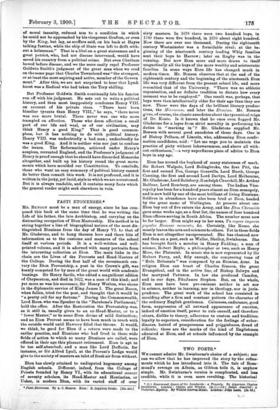BOOKS.
THE UNITED KINGDOM.*
THERE are many methods of writing history, and the only true way will (we hope) never be discovered. Since Lucian wrote his famous satire, wits and scholars by the thousand have ridiculed our chroniclers, or attempted to point out the narrow road of excellence. This one has pinned his faith to memoirs; that one has declared that nothing is credible save an Act of Parliament; while they are not lacking who declare that the first essential of an historical masterpiece is to be dull. To one school, again, Kings and Queens seem worth- less intruders; to another the people is merely servile. Drums and trumpets were an offence unto the ear of the late Mr. J. R. Green, and the Bishop of Chester shudders at a touch of romance. And the learned gentlemen who preside over the Ecole des Ohartes go even further, for they deny the name of historian to all save the students who decipher manuscripts.
As with material, so it is with style. There are many historians who, both in theory and practice, dispute the encroachment of the picturesque, and who declare openly
• The United Kingdom : a PoZilical History. By Goldwin Smith, D.C.L. London : Macmillan and Co. [Ns.]
that anything beyond a bald statement is fiction. So it is that the late Professor Seeley weakened his influence, which should have been wide, as it was admirable. In his eyes a finished style meant a lack of dignity, and so he expressed his profound knowledge and brilliant generalisation in such terms as render him unattractive and even difficult. But, after all, there is room in the world for all schools of thought and expression, and the best answer to Lucian's pamphlet is a simple negation. There is no way to write history ; there are twenty ways, and each excellent in itself. Some have a better understanding of manners than events. These will look for their material in the memoirs of the past. Others thrill only at the shifts and changes of high policy. These will consult Parliamentary debates and political records. And all, of either party, whose honesty and intelligence aid them, may perform an excellent service. But one distinction must be made. History was once nothing more than an art, based upon the science of research. To-day it is in danger of becoming a mere science, which stops short at the research which is its base, and pro- fesses that proportion and beauty and character are beyond its province. Yet dry bones will never make a living organism, and the most of our modern histories will assuredly find their place among the ruined monuments of the dead.
Now Professor Goldwin Smith has found the proper mean. He is modern, in that he specialises ; he is of an older fashion, in that he writes an English which is at once lucid and appro- priate. It is not his purpose to picture for his readers the romance of history. He is concerned only with politics, and though (as we think wrongly) he divides his book up into reigns, he is silent concerning the pageants and wars which have given colour to our national life. His object is to show the development of political Britain—Great and Greater— and he shows it with a clearness of style and sobriety of judgment which are beyond praise. It is our greatest achievement to have displayed a genius for self-government, which has been the envy of the world, and which the envious ones have never been able to imitate. Yet though our government is the result of the popular genius, it was not invented by design. It grew up gradually, and suffered such changes as were dictated by revolution and statesmanship. What we owe to such men as Simon de Montfort is very clearly set forth in these volumes. But Edward L is very properly Professor Goldwin Smith's hero. "Edward the First reigns now," says the author, "through the institutions to which he gave life over almost all European nations, in America, in Australia. in Japan. He will continue to reign, even if his special institutions should pass away, as the statesman who achieved a union of authority with national opinion." The praise is high, yet not excessive. Edward L is comparable to Caesar, to Napoleon. to the very few men of genius who have combined military glory with statesmanship. Yet even in his praise of Edward Professor Goldwin Smith preserves a certain moderation :—" To credit Edward with a political theory would be too much; the days of political philosophy were not yet ; no one had yet thought of framing a constitu- tion. But Edward had statesmanlike instincts and a policy." So wide a generalisation is not sound. It is hardly too much to say that long before the thirteenth century political philosophy had in a large part of the field heard its last word spoken. Wbat Thucydides and Plato and Aristotle wrote, what Cmsar practised on many points, closed the discussion. Whatever has been said since has been but a variation on the ancient theme. But a false generalisation does not impair the eloquent and well-deserved panegyric of Edward, and it is here that Professor Goldwin Smith finds his happiest phrases and most easily convinces his readers.
The weak point of the hook is its author's incapacity to hide his prejudices. There is no disguising the fact that Professor Goldwin Smith does not love a Tory ; not seldom he seems to recoil even from a strong Minister. He is grossly unfair to Marlborough, whom he saddles with a weak character ; and the truth is that Marlborough, peer- less in strength, suffered from the weak character which hampered his contemporaries. His account of Chatham might have been written by a political partisan, and to us is quite unintelligible. "Presently suppressed gout," says the Professor, "not unmingled, perhaps, with the influence of that uncontrolled egoism which is the source of moral insanity, reduced him to a condition in which he could not be approached by his vicegerent Grafton, or even by the King, but lay, as scoffers said, on his back at Hayes talking fustian, while the ship of State was left to drift with- out a helmsman." That is a libel on a great statesman and a great patriot, who, had not disease intervened, would have saved his country from a political crime. But even Chatham bowed before disease, and we the more easily repel Professor Goldwin Smith's judgment of the great man when we read on the same page that Charles Townehend was " the strongest, or at least the most aspiring and active, member of the Govern ment." After this, we are not surprised to hear that Lynd- hurst was a Radical who had taken the Tory shilling.
But Professor Goldwin Smith continually lets his fancies run off with his judgment. He sets out to write a political history, and then most inappositely condemns Henry VIII. on account of his private vices. " There have been bloodier tyrants than Henry VIIL," he says, " there never was one more brutal. There never was one who more trampled on affection. Those who deem affection a small part of our life and weal, or of our civilisation, may think Henry a good King." That is good common- place, but it has nothing to do with political history. Henry VIII. was undoubtedly a bad man ; undoubtedly he was a good King. And it is neither wise nor just to confuse the issues. The Reformation, achieved under Henry's auspices, recreated England, and the Professor's judgment of Henry is proof enough that he should have discarded Monarchs altogether, and built up his history round the great move- ments which have moulded our Constitution. To conclude, those who want an easy summary of political history cannot do better than consult this work. It is not profound, and it is written in the jerky, yet lucid, style to which we are accustomed. But it is always readable, and it contains many facts which the general reader might seek elsewhere in vain.







































 Previous page
Previous page